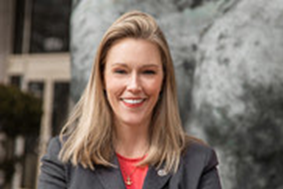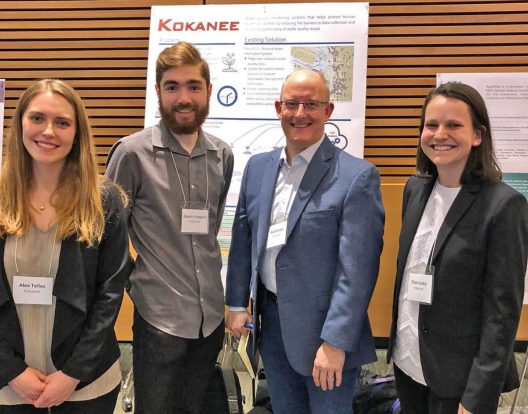Affairs of Marine & Environmental Affairs
Career News:
Danielle (Rioux) Blacklock ’09 was selected as the next director of NOAA Fisheries’

Office of Aquaculture. Danielle began her new post in mid-March, continuing her decade-long service to NOAA. Most recently, she was the Senior Policy Advisor for Aquaculture at NOAAA Fisheries. Danielle was kind enough to serve as one of the inaugural speakers for the SMEA Speakers Series, and offered a talk “Untapped Potential: Marine Aquaculture in the United States”.
Following the end of her fellowship with the US Department of Energy in the midst of the pandemic, Megan Plog ’19, has begun a role as the first-ever Environmental Programs Coordinator for the Town of Frisco, and she’s eager to work in conjunction with “all of the other talented climate and environment professionals in Summit County”.
Two alumni serve in prestigious roles at the Ministry of Agriculture, Forestry, and Fisheries’ Fishery Agency of Japan (FAJ): Shingo Ota ’91 is the Director-General for International Fisheries, and represents Japan in all international consultations regarding fisheries. Takashi Koya ’93 is now serving as the Deputy Director-General of the FAJ, the top position for a technical officer in the agency.
Following a year as a Knauss Fellow on the Senate Commerce Committee, Valerie Cleland ’18 has begun a position as an Oceans Advocate with the Natural Resources Defense Council (NRDC). She’ll be “working with Congress and the Administration on NRDC’s ocean policy priorities”.
Honors, Awards, & Recognition:
SMEA was well-represented among this year’s Washington Sea Grant Hershman Fellow selection. Henry Bell ’20 will serve as a fellow with the WA State Department of Ecology in Olympia focusing on coastal hazards resilience and shoreline management. Meanwhile, Emily Buckner ’20 will be working to organize a large research network to aid the Dungeness crab fishery, and will be supporting the Pacific Northwest Crab Research Group. The Port of Seattle will benefit from the support of Elise Lasky ’20 in the development of an ocean acidification plan as well as other ongoing projects.

Alex Tellez and Elise Lasky, ‘20 competed in the 2020 Alaska Airlines Environmental Innovation Challenge alongside teammates from the Foster School of Business, School of the Environmental and Forest Science, and School of Computer Science and Engineering. Their team, Kokanee Systems, competed with a water quality monitoring and alert system consisting of a floating monitor that feeds real-time, continuous data to their custom cloud-based data analytics platform. Elise and Alex, and their team took home 3rd place!
A US Student Research Fulbright Award was bestowed upon Angela Cruz ’19. Angela’s proposed project is to perform a gender analysis of the blue swimmer crab fishery in Betahwalang and Lampung, Indonesia amidst major fishery reform and development of aquaculture facilities.
Publications:
A review paper featured the work and collaboration of Dr. Karen Dyson ’09 and Dr. Cleo Woelfle-Erskine, among others. The work shows that racism and classism “are impacting the biodiversity, evolutionary shifts and ecological health of plants and animals in our cities”. Their work was also part of a feature in UW News.
PhD research completed by Caitlin Shishido ’13 on Giant Sea Spiders was published in Proceedings of the Royal Society B and then featured in The New York Times. Caitlin finished her PhD at UH Manoa in 2019, and is a Fish and Wildlife Biologist with the USFWS in Hawai’i.
A collaborative research project of Megan Plog ’19, Prof. Nives Dolšak, Prof. Laura Evans, and Prof. Aseem Prakash, examining cross-sectoral climate policies adopted by Native American Tribal governments, published in Climatic Change, highlighted the importance of intertribal networks.
A study on eelgrass beds and their reduction of dinoflagellates was authored by a team of SMEA-related folks including faculty member Ryan Kelly, research consultant Emily Jacobs-Palmer, former post-doc Ramón Gallego, as well as Kelly Cribari ’19.
Samantha Farquhar ’19 , FLAS Fellow was published in Arctic for her work on the controversial topic of Inuit seal hunting. The Inuit community, heavily impacted by changes to fishery policies and markets, have taken to social media to reclaim the narrative around these practices.
The potential consequences of the falling levels of oxygen saturation in the oceans, driven by rising temperatures and eutrophication was the topic of a report drafted by faculty member Eddie Allison accompanied by Hannah Basset and Alex Stote ’19 and included in the publication Ocean deoxygenation; Everyone’s problem sponsored by the International Union for Conservation of Nature.
Bringing together key ideas in development economics, business studies, and aquaculture, a paper co-authored by Claire Dawson ’17 advances efforts for inclusive business models for aquaculture. She conducted much of the work as part of an internship with WorldFish while pursuing her MMA.
Growing out of her thesis work, Kanae Komaki ’18 and faculty member Dave Fluharty authored “Options to Improve Transparency of Environmental Monitoring Governance for Polymetallic Nodule Mining in the Area”, which offers a critique of monitoring techniques and proposes innovations to develop more transparent monitoring of deep seabed locations beyond national jurisdictions. The article was in Frontiers in Marine Science.
Presentations:
A number of alumni all served as guest speakers in Dave Fluharty’s “US Fisheries Management Policy” (offered jointly with SAFS) sharing insights about a variety of topics in March 2020. Craig Bowhay ’85, from the Northwest Indian Fisheries Commission presented “Tribal Treaty Rights to Fish”. Guillermo Gomez ’82, of Gomez-Hall and Associates delivered “Managing Global Tuna Fisheries” and Annika Saltman ’15, from Fishermen’s Finest and Chris Woodley ’00, Executive Director of the Groundfish Forum served on a panel about the fishing industry.
Michael Jacobson ’94 visited the Marine Policy Analysis course taught by SMEA Director Nives Dolšak in May 2020 to deliver a talk entitled “Concepts in Performance Management”.
Connections:
Members of the class of 2010 capitalized on the pandemic to reconnect over Zoom for their 10 Year Reunion in May. Cirse Gonzales, Katie Schleit, Ethan Lucas, and Amanda Fisher helped to organize, and were happy to be able to reconnect with “far-flung classmates” with folks joining in from France, DC, and in the Puget Sound region.
A fantastic team of alumni joined faculty, staff, and current students to offer a virtual Prospective Student Visit Weekend in early April 2020. Andy Bennett ‘00, a Principal Engineer with KPFF, Jeremy Rusin ‘02, Deputy Director for Science & Research at NOAA’s Alaska Fisheries Science Center, Rachel Gregg ‘07, Senior Scientist for EcoAdapt, and Tressa Arbow ‘19, Washington Sea Grant Hershman Marine Policy Fellow, joined current SMEA student Lizzy Matteri ‘21 to offer their reflections and insights on the MMA and their subsequent careers.
Twelve departments from UW were represented by volunteer Science Fair Mentors, helping 5th grade students at Bryant Elementary School in Seattle. Emily Buckner ’20 volunteered over 20 hours during winter quarter to help students learn about scientific fields of study and the scientific method. “Emily provided inspired leadership, enthusiasm and experience with the scientific process”, notes Bryant Elementary School leadership.
Perry Falcone ’00 in his role as Kokanee Recovery Manager with King County Water and Land Resources Division partnered with Trout Unlimited, the Snoqualmie Tribe, and others to bring a film screening to campus to showcase Spawning Grounds, about local Kokanee recovery efforts.